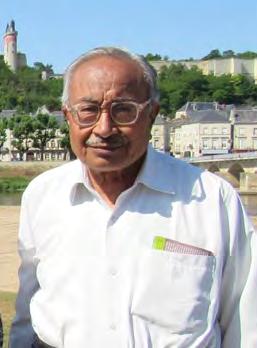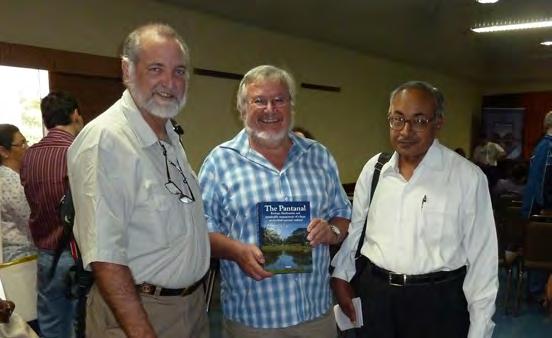
9 minute read
SWS News
Interested in taking your SWS involvement to the next level?
SWS IS ACCEPTING NOMINATIONS FOR INDIVIDUALS TO SERVE AS PRESIDENT-ELECT ON THE EXECUTIVE BOARD
Deadline to submit nominations:
Monday, February 21, 2021.
PRESIDENT-ELECT DUTIES AND RESPONSIBILITIES
• The President-Elect shall assume duties and responsibilities of the President at the conclusion of the President's term or if the office is vacated. • In the absence of the President or in the event of inability or refusal to act, the President-Elect shall perform the duties of the President, and when so acting shall have all the powers of and be subject to all the restrictions of the Presidency. • The term of office of the PresidentElect shall be one year or until the next annual meeting and then the PresidentElect shall automatically become President for the next year. • If the President-Elect assumes the duties of President prior to the normal end of term this will continue for the remaining time of the President's term, and continues for the next year, as elected. • If the President-Elect is unable to fulfill the term of office of the President, the immediate Past President shall assume the interim Presidency until an election can be held. • The primary duties of the PresidentElect shall be to assist the President in the execution of the duties delegated by the Bylaws. • The President-Elect shall serve on the Local Program Committee for the Annual Meeting that will occur when the President-Elect becomes President and shall serve as a liaison between the Executive Board and the Local Program Committee.
SWS Annual Awards: Do you know someone deserving of recognition?
FELLOW AWARD DEADLINE: MARCH 5, 2021
Fellows are active members of the Society who have been nominated by other active members to receive the honor, recommended by the Fellows Committee, and elected by the SWS Board of Directors. Fellow is the highest recognition of membership bestowed by the Society. Submit nomination.
LIFETIME ACHIEVEMENT AWARD DEADLINE: MARCH 5, 2021
The Lifetime Achievement Award honors individuals who have achieved special distinction in their career through contributions to wetland science and management, specific to research, education or policy. The award comes with a Lifetime membership in the Society and is offered in odd-numbered years. A nomination letter, two supporting letters, and a resume are required for each nomination. Submit nomination.
MERIT AWARD DEADLINE: MARCH 5, 2021
The Merit Award recognizes individuals for specific accomplishments in any field of wetland science and management in order to inspire future efforts. The award comes with a three-year membership in the Society. A letter outlining the specific achievement, two supporting letters, and a resume are required for each nomination. Submit nomination.
STUDENT RESEARCH GRANT DEADLINE: MARCH 8, 2021
The Society of Wetland Scientists aims to develop and encourage wetland science as a distinct discipline by providing support in student education, curriculum development and research. To support this goal, SWS offers partial funding of wetland-related research conducted by undergraduate and graduate students from an accredited college or university worldwide. These grants are intended to aid student's costs of travel, room and board in the course of field investigation and to help cover costs of expendable materials and supplies required in the execution of the proposed research. Submit application.
CHAPTER AND SECTION DEVELOPMENT DEADLINE: FEBRUARY 19, 2021
The SWS Board of Directors is pleased to offer a Development Grant to Chapters and Sections in order to expand programs and membership in keeping with our mission to promote understanding, conservation, scientifically based management and sustainable use of wetlands throughout the world. The term of the grant is a maximum of five years and amounts up to $4,000 will be considered by the SWS Awards Committee. Selection of Chapters and/or Sections to receive funding is based on demonstration of need, quality of proposal, statement of objectives, and likelihood of success. Grant money will be transferred to the Chapter/Section account on an incremental basis. The Chapter president and treasurer/Section Chair will be responsible for sending an annual report to the Board of Directors and the SWS Awards Committee detailing how the money was spent and how goals have (or have not) been met. There will be an opportunity for explanation after one year if goals have not yet been met. A final report will be due at the end of the grant period. Submit application. n
The Journal WETLANDS is Moving to Continuous Publishing!
Marinus L. Otte, Editor-in-Chief, WETLANDS
Much has changed over the past decade as the professional journal WETLANDS, owned by the Society of Wetland Scientists and published by what is now SpringerNature, moved from paper print to on-line publishing. The benefits of on-line publishing are, among others, a much faster process for submission and review and easy access from anywhere in the world. Gone are the days when manuscripts had to be typed, then copied, then sent around by mail, and gone are the days when authors had to wait months for papers to be printed and bound into issues. Gone also are the days when bookshelves ran out of space. Where in the past authors had to pay for images being published in color, it is now free-of-charge, at least for WETLANDS. On-line publishing also created an opportunity to attach supplementary materials to articles. This provided an easy means to include the raw data with articles, without it taking up multiple pages in the main body of the text, as well as additional images. Open Access became a reality as well. WETLANDS is now a hybrid journal, where authors can choose to publish for free by transferring copyright to the publisher and give access to the article for subscribers only, or to provide immediate access on-line to anybody by retaining the copyright themselves for a fee payable to the publisher.
Even though the journal has been using on-line submission and publishing, and articles were published on-line and assigned a Digital Object Identifier (DOI) within days for about a decade now, designation of articles to an issue number and page numbers still took several months. Per January 1, 2021, that will be a thing of the past. Once accepted for publication, articles will be formally published on-line within days and have an article number instead of issue and page numbers. They will still be collected in ‘issues’ collected in order of acceptance and the option to receive those in hardcopy print will continue to be available for those willing to pay extra. However, the articles will also be collected on-line in so-called Topical Collections. This means that articles will be collected together under topics such as Ramsar, Wetland Restoration, Wetland Animals, Wetland Biogeochemistry, Applied Wetland Science, and Wetlands and Indigenous People. There are now 28 such Topical Collections. For a full list, see the submission guidelines at https://www.springer. com/journal/13157/submission-guidelines.
I very much look forward to receiving your manuscripts! n
SWS Annual Meeting 2021
Due to the COVID-19 global pandemic, the SWS Board of Directors and Staff have decided to hold the SWS 2021 Annual Meeting virtually. Online registration and meeting details will be coming soon.
We look forward to offering you an exciting program covering the emerging and important topics in our field, with opportunities for networking. Centered around the theme Wetland Sciences 2021: Adaptation Drives Innovation, this virtual meeting will include symposia, contributed sessions, workshops, plenary sessions, and space to connect with other attendees from across the globe.
Moving our face-to-face meeting to a fully virtual format also allows us to host a program that better reflects the different time zones of our attendees.
Save the dates: June 1, 3, 8, and 10, with optional
workshops on Wednesday, June 9. We look forward to welcoming you to the SWS 2021 Virtual Meeting in June! n
Remembering Dr. Brij Gopal
Internationally renowned aquatic scientist Dr. Brij Gopal, President of National Institute of Ecology and FounderCoordinator of Centre for Inland Waters in South Asia, passed away on January 4, 2021. He retired in 2009 as Professor of Environmental Science from the Jawaharlal Nehru University, New Delhi. He had worked in all aspects of ecology, biodiversity, ecosystem functioning, water quality, economic valuation, conservation, restoration and management of a variety of aquatic ecosystems from the mountains to the coasts. He examined traditional management by local communities, socio-economic aspects, climate change and issues related to policies and law in the context of integrated water resources management. He was one of the lead authors of the 2007 Nobel Peace Prizewinning IPCC’s Fourth Assessment Report (2007). He was the first recipient of the Young Scientist Medal of the Indian National science Academy (1974) and is the only recipient of the NaumannThienemann Medal (2004) of the International Association of Limnology (SIL) from Asia, Africa and South America. He was the second Asian recipient of the International Fellow award (1997) of the Society of Wetland Scientists. He was a guest Professor at Swiss Federal Institute of Technology in Zurich and Editor–in Chief of the International Journal of Ecology and Environmental Sciences for decades.
Dr. Gopal served on numerous committees related to wetlands, rivers, lakes, fisheries, forests, environmental impact assessments, including those of the ICAR, Planning Commission, Ministry of Environment, Forest and Climate Change, State High Court of Himachal Pradesh and the Supreme Court of India. He was Chair of Wetland Conservation and Management Working Group at the Chhattisgarh State Planning commission and the National Green Tribunal. Most recently, he was a member of the National Green Tribunal appointed Principal Committee for Restoring the Yamuna River and the Ministry of Water Resources Committee on Restructuring of Central Water Commission and Central Ground Water Board.
During his teaching years, Dr. Gopal mentored a number of students who currently occupy eminent posts nationally and internationally. He is survived by his daughters, Sudha and Anjali, his son Rajiv, and his grandchildren. n

In Memory of Dr Brij Gopal
Max Finlayson, Immediate Past President SWS
I was pleased to be able to attend an online tribute for our friend and colleague Dr Brij Gopal on 1 February 2021, on the eve of the 50th anniversary of the signing, in the Iranian city of Ramsar, along the southern shores of the Caspian Sea, of the text of the Convention on Wetlands. The event was organised by the Indian Rivers Forum in cooperation with his family, with a short video accessible at https://www.facebook.com/IndiaRiversForum/videos/4029391203784691/
In my comments I was pleased to be able to point to his long association with the INTECOL International Conferences, having organised the first in New Delhi in 1980. He was also a regular participant in SWS meetings, and active in Indian and international science and river/wetland management issues. His legacy is shown through his publications, as well as his students and the many colleagues that he mentored and supported, as well as the many lectures and conference talks that he presented. He was a forthright speaker and always ready to share his knowledge about wetlands and rivers.
My links with Brij started in 1981 when he visited Australia for the International Botanical Conference. In the company of another legend of aquatic plant ecology and management, Dr David Mitchell, I was privileged to spend a week looking at waterways, wetlands and weed problems in the inland irrigation districts of SE Australia, and discussing both the ecology and management issues we faced. That led to an ongoing association with Brij and meetings in many places with many wonderful and erudite wetland ecologists and managers, including meetings alongside the lakes and ancient fish ponds of South Bohemia, the magnificence of the Okavango Delta in Botswana and the Pantanal in Brazil.
Thank you Brij for your scholarship and your friendship. n
Photo: Max Finlayson, Wolfgang Junk and Brij Gopal








